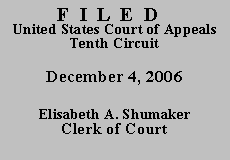

| TIMOTHY JOHN KENNEDY,
Plaintiff-Appellant, v. OFFICER LAKE, Defendant-Appellee. |
|
I. Background
Kennedy is serving a sentence for a 1997 double homicide conviction. On August 9, 2002, Kennedy was incarcerated at CDOC's Centennial Correctional Facility and was scheduled to meet with a privately retained investigator, Michael Martinez. When Martinez arrived at the prison, he was informed by Officer Lake that he and Kennedy would be given a non-contact interview room that required them to communicate through a glass partition via a monitored telephone connection. At some point, Kennedy requested a contact interview room. Initially, Officer Lake agreed, but first requested to inspect certain legal papers Kennedy intended to give to Martinez. Kennedy claims he handed the papers to Officer Lake believing that he would merely "shake any papers for contraband, and then return them." R. Doc. 3, Sec. C at 2. Instead, Kennedy alleges "Officer Lake leaned up against a table and started to compleatly [sic] read [his three] typed pages of legal documents." Id. at 4-5. After approximately fifteen to twenty seconds, Kennedy asked Officer Lake to return the papers. Officer Lake complied, but then refused to allow the contact visit and instead required Kennedy and Martinez to continue using the monitored, non-contact interview room. This incident precipitated Kennedy's suit.
Before a magistrate judge, Kennedy argued that Officer Lake's denial of a contact visit violated his constitutional right of access to the courts. Officer Lake countered with a motion to dismiss pursuant to Fed. R. Civ. P. 12(b)(6) for failure to state a claim. The magistrate judge recommended that the motion be denied, but the district court rejected that recommendation. Reasoning that Kennedy failed to assert any actual injury given that he was permitted to meet with Martinez, albeit through a glass partition, the court ruled that Kennedy lacked standing. R. Doc. 104 at 7. Accordingly, the court granted the motion to dismiss. This appeal followed.
II. Discussion
We review de novo a district court's dismissal pursuant to Rule 12(b)(6) for failure to state a claim upon which relief can be granted. Stidham v. Peace Officer Standards & Training, 265 F.3d 1144, 1149 (10th Cir. 2001). Under Rule 12(b)(6), a complaint should not be dismissed for failure to state a claim "unless it appears beyond doubt that the plaintiff can prove no set of facts in support of his claim which would entitle him to relief." Hall v. Bellmon, 935 F.2d 1106, 1109 (10th Cir. 1991) (quotation omitted). In making this determination, a court must presume that "plaintiff's factual allegations are true and construe[] them in the light most favorable to the plaintiff." Id. At the same time, the court should construe a pro se plaintiff's pleadings liberally, holding them "to a less stringent standard than formal pleadings drafted by lawyers." Id. at 1110.
"It is now established beyond doubt that prisoners have a constitutional right of access to the courts." Bounds v. Smith, 430 U.S. 817, 821 (1977). This right extends to civil rights claims arising under 42 U.S.C. § 1983, White v. Colorado, 157 F.3d 1226, 1233 (10th Cir. 1998), and may require that prison officials provide prisoners with adequate law libraries or adequate assistance from persons trained in the law, Bounds, 430 U.S. at 828. Notwithstanding this right, however, an inmate alleging a constitutional violation must demonstrate that he suffered actual injury. Lewis v. Casey, 518 U.S. 343, 349 (1996). As the Supreme Court explained in Lewis, the actual injury requirement derives from the doctrine of standing, which seeks to constrain courts to their proper role of providing relief to claimants who have suffered, or will imminently suffer, actual harm, without usurping the political branches' authority to administer government institutions. Id. at 349-50. Were the actual or imminent injury requirement absolved, courts of law would find themselves enmeshed in this administrative function of the other branches. See id. at 350.
Here, Kennedy lacks standing because he has suffered no actual harm. Indeed, Kennedy concedes that Officer Lake permitted him to meet with Martinez; his only allegation of harm is that they were required to meet in a non-contact interview room. Although Kennedy insists his Sixth Amendment right to counsel entitled him to a confidential, contact meeting with Martinez, the Sixth Amendment does not create such a per se rule of entitlement. See Mann v. Reynolds, 46 F.3d 1055, 1060 (10th Cir. 1995) ("[T]he Sixth Amendment does not require in all instances full and unfettered contact between an inmate and counsel."). Kennedy has failed to plead an actual injury and therefore does not have standing to bring this suit. The district court was correct to dismiss the claim.
III. Conclusion
The judgment of the district court is AFFIRMED. All outstanding motions are DENIED as moot.
Entered for the Court
Circuit Judge
*. After examining the briefs and appellate record, this panel has determined unanimously that oral argument would not materially assist the determination of this appeal. See Fed. R. App. P. 34(a)(2); 10th Cir. R. 34.1(G). The case is therefore ordered submitted without oral argument. This order and judgment is not binding precedent, except under the doctrines of law of the case, res judicata, and collateral estoppel. It may be cited, however, for its persuasive value consistent with Fed. R. App. P. 32.1 and 10th Cir. R. 32.1.